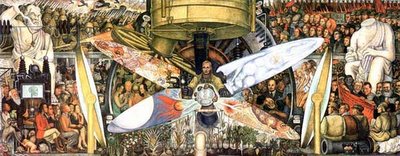 www.diegorivera.com
www.diegorivera.comAmerica Para Todos
A few years ago, a friend of mine--Creek Indian, from Oklahoma--was boarding a Kansas City bus when the brown-skinned bus driver half-joked, "You Indians sure look a lot like Mexicans."
My friend snapped back, "Nah, you Mexicans just look like Indians."
Of course, the joke was the thing not said--how political borders divide native Americans to the point where ethnic similarity is a surprise. Obviously the difference in red and brown is not some biological equation that comes out of miscegenation between Spaniards and Indians (certain kinds of facial hair maybe), but it is division born out of the rise of nation states, and with multinational business driving the World Trade Organization and World Bank to solutions such as NAFTA, the border that divides the indigenous people of North America above and below the Rio Grande is a border that no longer exists for the CEO. In other words, these borders only blind average Americans to our common ground.
As if there's an American identity without our brown brothers and sisters. Let's assume we can forget how Mexican migrant farmworkers played a fundamental role in establishing our agricultural economy or how the "Bracero" program--exploiting migrant farmworkers when we needed them in 1942--helped us to win World War II and ensure our role as a superpower. Even if we can forget how brown Americans built this country, how can we imagine an American culture without its Latin influences?
Of course, many never even contemplate the way our culture is fundamentally shaped by the influence of West Africans. Black Americans just came here with the Europeans in the 1500s and built the country. From our uniquely American accents, grammar and vocabulary to our popular culture, no aspect of our culture has ever developed independent of this influence. And the same should really be said of our Latin American influences, in part because they overlap so much.
If we talk music, that truth is plain, starting with the fact that it's nearly impossible and probably meaningless to try to separate the West African and Latin American influences on the musics of the diaspora, the path of the slave trade through Latin America. From rhumba bands to the Bo Diddley beat, "Louie Louie" to "96 Tears" to "Land of a 1000 Dances," hip hop to reggaeton--Latin American polyrhythms have shaped our popular culture.
Even those aspects of our music most stereotyped as ethnocentric--the "western" ranchera sounds in country and western, or the Spanish style Nudie suits or cowboy hats and boots--all spring from Latin American tradition. And out of this exchange, there are those fascinating dialogues between Germanic and Eastern European farmers and Latin Americans that create the common ground of polka and norteno, with Tex Mex and Southern R&B talking back and forth between accordian and Farfisa and Hammond B3 and whatever descendent of Casio we've graduated to now.
And then, of course, there's the core symbol of the democratization of American popular music, that instrument just about everyone could order from Sears on the cheap and play in their living rooms, bedrooms or on their front porches. That Spanish string instrument that embodies virtually all of the big gestures in rock and roll--the gunslinger's weapon, the axe, the iconic tool of rock bravado--la guitarra, the Guitar. Take away the guitar, do we even have what we think of as the rock revolution; take away the Latin influence, is rock even possible?
After all it's not the individual parts that matter so much as the mix that can't be disentangled. It's fairly easy to see how Latin American music helped to shape both California rock and modern country, for instance, just as it's easy to see the role it played in the attitude, identity and feel of gangsta rap and its inheritor, crunk. We can say that Roy Orbison sang like some lost opera star because he grew up listening to ranchera music in Texas, and that would be true. But there's also what Roy Orbison sang about--lost love and loneliness, sure, but also, over and over and over again, of dreams. Are there Latin American roots not only when Bruce Springsteen trots out "Rosalita" but when he evokes Roy Orbison for the dreams of "Thunder Road" or when he closed his last tour singing Suicide's "Dream Baby Dream" like a prayer for the country? Yes. Of course.
The Latin fabric that is essential to the American identity isn't overlooked because it's minor or anything close to invisible. It's overlooked for more insidious reasons, most fundamental being that if we confront our Latin heritage, then we may have to come to grips with how such accepted notions as borders actually serve to keep average people fighting one another instead of joining voices in unity.
As should be clear, our cultural intuition is already far ahead of the curve. American music is Latin American music, and I don't have to cite Sean Paul, Rihanna, Daddy Yankee, Akon, Frankie J or Shakira at the top of the charts to prove that. And when the nation's leaders don't seem to have any concept of what it means to tell the truth, maybe we shouldn't be too quick to dismiss the political dimensions of Wyclef Jean and Shakira singing, "Hips Don't Lie." Amen to that.
So when Prince winds up his new search for grace, 3121, an album laced with Spanish themes, it shouldn't be surprising that he finds communal salvation with Sheila Escovedo providing enough timbales to make Tito Puente proud. This is music for an America without borders, where all the strains of our peoples' culture work together. The result? Go play that jam and tell me it doesn't sound like liberation.
--Cinco de Mayo 2006